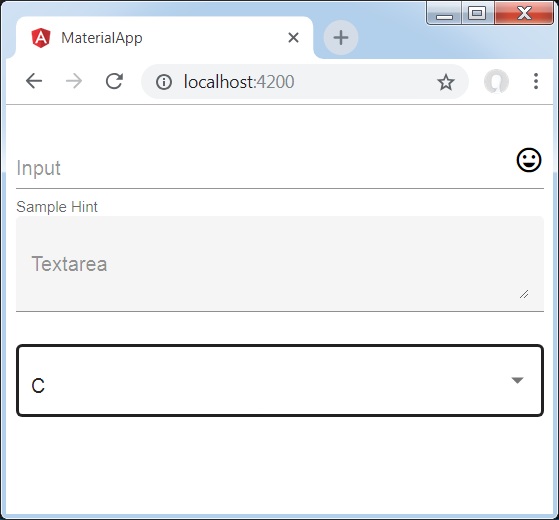Winkelmaterial 7 - Formularfeld
Das <mat-form-field>, eine Winkelrichtlinie, wird verwendet, um einen Wrapper über Winkelkomponenten zu erstellen und um Textstile wie Unterstreichung, Fettdruck, Hinweise usw. anzuwenden.
Folgende Winkelkomponente kann innerhalb verwendet werden <mat-form-field>.
<input matNativeControl>
<textarea matNativeControl>
<matNativeControl auswählen>
<mat-select>
<mat-chip-list>
In diesem Kapitel wird die Konfiguration vorgestellt, die für die Verwendung einer Mattenformfeldsteuerung in Angular Material erforderlich ist.
Erstellen Sie eine Winkelanwendung
Führen Sie die folgenden Schritte aus, um die Angular-Anwendung zu aktualisieren, die wir in Angular 6 - Projekt-Setup- Kapitel erstellt haben.
| Schritt | Beschreibung |
|---|---|
| 1 | Erstellen Sie ein Projekt mit dem Namen materialApp, wie im Kapitel Angular 6 - Projekteinrichtung erläutert . |
| 2 | Ändern app.module.ts , app.component.ts , app.component.css und app.component.html wie unten erläutert. Lassen Sie den Rest der Dateien unverändert. |
| 3 | Kompilieren Sie die Anwendung und führen Sie sie aus, um das Ergebnis der implementierten Logik zu überprüfen. |
Es folgt der Inhalt des modifizierten Moduldeskriptors app.module.ts.
import { BrowserModule } from '@angular/platform-browser';
import { NgModule } from '@angular/core';
import { AppComponent } from './app.component';
import {BrowserAnimationsModule} from '@angular/platform-browser/animations';
import {MatInputModule,MatOptionModule, MatSelectModule, MatIconModule} from '@angular/material'
import {FormsModule, ReactiveFormsModule} from '@angular/forms';
@NgModule({
declarations: [
AppComponent
],
imports: [
BrowserModule,
BrowserAnimationsModule,
MatInputModule,MatOptionModule, MatSelectModule, MatIconModule,
FormsModule,
ReactiveFormsModule
],
providers: [],
bootstrap: [AppComponent]
})
export class AppModule { }Es folgt der Inhalt der geänderten CSS-Datei app.component.css.
.tp-container {
display: flex;
flex-direction: column;
}
.tp-container > * {
width: 100%;
}Es folgt der Inhalt der geänderten HTML-Hostdatei app.component.html.
<div class = "tp-container">
<mat-form-field appearance = "standard">
<input matInput placeholder = "Input">
<mat-icon matSuffix>sentiment_very_satisfied</mat-icon>
<mat-hint>Sample Hint</mat-hint>
</mat-form-field>
<mat-form-field appearance = "fill">
<textarea matInput placeholder = "Textarea"></textarea>
</mat-form-field>
<mat-form-field appearance = "outline">
<mat-select placeholder = "Select">
<mat-option value = "A">A</mat-option>
<mat-option value = "B">B</mat-option>
<mat-option value = "C">C</mat-option>
</mat-select>
</mat-form-field>
</div>Ergebnis
Überprüfen Sie das Ergebnis.

Einzelheiten
Als erstes haben wir ein Formularfeld mit dem Mat-Form-Field-Wrapper erstellt. Wir haben das Erscheinungsbild des Formularfelds mithilfe des Attributs "Erscheinungsbild" geändert.
Anschließend wird dem Formularfeld ein Formularsteuerelement hinzugefügt.